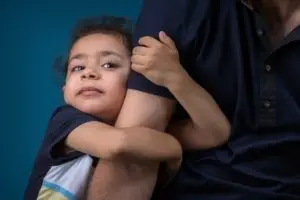
If you have been convicted of a crime in the state of California, you may be forced to sacrifice custody or unsupervised visitation of your children. This is especially true for crimes involving children.
In cases wherein the conviction does not pertain to a crime involving a child, the matters of custody and visitation are left up to the discretion of the judge presiding over the family court case. For instance, if you have been convicted of charges related to violent behavior or substance abuse, the judge will weigh carefully whether an award of custody or visitation would be in the child’s best interests. Every case is different, and so one judge may award custody or visitation, while another judge who is given the same information might not.
Cases Involving Child Abuse
California law is especially strict in cases wherein a person was convicted of child abuse, or was required to register as a sex offender. In the former, the parent will not be awarded custody or visitation unless there is a clear ruling by the family court judge that the parent does not pose a danger to the child.
In the latter, and in accordance with section 3030 of the California Family Code, if a person receives a felony conviction that requires him or her to register as a sex offender, the guiding principle is that this person poses a significant danger to the child. As such, he or she will not be permitted to live with the child, nor will unsupervised contact with the child be permitted.
For a free legal consultation, call (310) 896-2723
Reasons People Lose Custody of Their Children
When a person loses custody of his or her children, this is not limited to not being able to live with the children. In some cases, it also means that even visitation with the child may be limited or subject to supervision.
In addition to what are perhaps some of the more obvious reasons that a person would lose custody of his or her children (physical, emotional, verbal, or sexual abuse), there are several other reasons for the loss of custody, including:
- Abduction of the child
- False allegations of abuse
- Neglect
- Domestic violence, even if the child is not the target
There are additional reasons why a parent would lose custody of a child, though these often depend on the nature and severity of the situation. For example, violating a custody order would not necessarily put someone at risk of losing custody, since a violation can be as simple as being late to a custody exchange. A repeated pattern, however, of willfully disobeying the court’s order may put that parent’s custody and visitation rights in jeopardy.
A violation of a custody order that would be considered more severe would be for one parent to make a decision that significantly affects the child’s life before consulting with the other parent, such as a major medical decision. This may be enough of a violation to encourage a court to reverse custody.
There are, of course, a number of other reasons why a parent might lose custody or visitation privileges. Each situation is different, as is each judge’s discretion. Having experienced legal counsel advocating on your behalf could help swing the tide more in your favor.
Domestic Violence and Child Custody
A common misconception is that domestic violence only affects the person who is being abused. This is not true. It is just as damaging for a child to witness a parent being abused as it is for the parent to take the abuse.
Domestic violence is not limited to couples who are married, or even to couples who live together. Violent behavior among couples who are dating is also considered domestic violence. As such, if a child’s parents are divorced, and the parent with whom the child lives begins dating again, it is considered domestic violence if that new partner becomes violent toward the child’s parent.
When a judge is deciding to whom to award custody in the state of California, he or she will take into consideration any history of abuse by the parent seeking custody. This is to determine whether an award of custody to that parent would be in the best interests of the child.
The abuse being considered is not limited to the children in question. The court will also determine whether that parent was abusive toward any of the following people and will make its decision accordingly:
- Any child related to the abusive parent by blood or marriage
- Any child to whom the abusive parent may be or have been a caretaker
- The other parent
- Current spouse, fiancé/fiancée, girlfriend/boyfriend
- Current or former roommates
Are you facing conviction and are concerned about losing custody of your children? We can connect you with an experienced criminal lawyer in Los Angeles and get you a FREE consultation. Fill out the contact form on the right or call (310) 896-2723 and get your free consultation today.
Call or text (310) 896-2723 or complete a Free Case Evaluation form
